|
Haftarah: Jeremiah 34:8-22, 33:25-26 THE CIVIL LAWS The previous Parashah talked about the Ten Utterances, known as the Ten Commandments, and the laws of the Altar of the Temple. This week’s Parashah continues to provide a glimpse into God's standard of holiness by detailing some of the laws needed for everyday file, which became known as the Civil Laws: Ve’eleh ha’mishpatim asher tasiim lifneihem. “And these are the ordinances which you shall place before them.” Shemot (Exodus) 21:1 Most people think of religion as a matter of spirituality. Our western civilizations differentiate between “Church (Religion)” and "State (Government)." Torah makes no such distinction. To God there is no realm of “religion,” to the contrary, all areas of life are intertwined and holiness derives from right and just business dealings just as from spiritual matters. The Sages teach that one who wishes to be a Hassid, a pious person, should be just as scrupulous to observe the Civil Laws as the spiritual ones. All these Civil Laws have their ruling based on the principles set by the Ten Commandments, just as our Constitution is the basis for all rulings in the American society. The inability of the Israelis - or any other society - to keep these laws does not invalidate their importance in shaping the moral character of individuals and of societies. Moshe is commanded to place them before the people; thus, they could have no excuse for not observing them. Following, are some of these laws - or God's ethics - from chapters 21, 22, and 23 of Shemot, which I found so appropriate for today, if only our society would abide by them: — 21:2. “If you buy a Hebrew servant, he shall serve six years; and in the seventh [shemitah year] he shall go out free, for nothing.” This is a commandment of mercy and tzedakah. Some equate it with slavery but this was never the case in the Israeli society. Here Torah implies that “if” you have come upon a situation in which a Jewish brother has become so impoverished that he has to sell his services, help him out of his extreme poverty by paying off his debt so that his family could continue to live a decent life and in turn this brother will work for you as a servant, not as a slave but as a free man. And just as one should work for only six days so, too, the servant should work, in this situation, for only six years and on the seventh he should be set free, for he worked for his payment. Nowhere in the Bible is slavery condoned, even though some erroneously used this passage to justify it. But what is more striking and contrary to our society is that welfare is also not condoned by the Torah. The one impoverished needs to work in order to maintain his dignity. This passage tells us that to the one who fell down should not be given a hand-out which will keep him down, but a helping-hand to raise him up. — 21:12. “He who strikes a man, so that he dies, shall be surely put to death.” This is about premeditated murder. The Torah makes a distinction between the premeditated murder and the accidental homicide. The capital punishment, which actually was established long before this commandment was given, is only for the premeditated murder, not only as a deterrent, but also as a closure for the injured family. The capital punishment is showing the society's value of protecting innocent life. — 21:15. “He who strikes his father, or his mother, shall be surely put to death.” Respect for parents is equated with respect for God, thus, lack of it, it is disrespect for God’s creation which is equated with murder. It may seem a bit extreme, but respect for parents is one factor in a society with high moral values. Unfortunately, the degradation of societies is also marked by the abuse of children by their parents, thus, the respect for parents is not anymore a natural behavior but an imposed one and, as such, human laws were passed to protect the children. But in this process, the society superseded the authority of the parents. Therefore, God's commandment is nullified not by the behavior of the children but by behavior of the society as a whole. The apostle Shaul foresaw this degradation for in his letter to the Ephesians he is instructing both children and parents: "Children, obey your parents in the Lord, for this is right. Honor your father and mother (which is the first commandment with a promise), so that it may be well with you, and that you may live long on the earth. Fathers, do not provoke your children to anger, but bring them up in the discipline and instruction of the Lord." — 21:17. “He who curses his father, or his mother, shall surely be put to death.” One who curses his parents has combined a violation of their honor with the contempt for God. As the previous commandment, the degradation of our society makes godly parenting almost impossible. When the adults - and the society by-and-large - display contempt for God, what do we expect from the behavior of the children? — 21:22. “If men quarrel, and hurt a pregnant woman, so that she miscarries, and yet no further harm follows; he shall be surely punished, according to what the woman’s husband will lay upon him; and he shall pay as the judges determine. But if there is any fatality, then you shall give life for life. An eye for eye, tooth for tooth, hand for hand, foot for foot, burning for burning, wound for wound, bruise for bruise.” There was never in the history of Judaism that this last injunction was taken literally. Apart from the capital punishment, which again shows the sanctity of life including the unborn life, “an eye for an eye” was always interpreted as giving the just retribution for the injury, nothing more and nothing less. Measure for measure. Similarly, Yeshua continued this analogy in His teachings for He was not advocating the tearing of one's eye or for cutting one's hand when He said, “If your right eye makes you stumble, tear it out… and if your right hand makes you stumble, cut it off.” Matthew 5:29 These are just expressions, metaphors if you will, of the measurements of sacrifices one has to do to live a righteous life. God is advocating righteousness and not dismemberment. God is advocating just retribution for the injured party. Mohandas Gandhi mocked God's Torah when he said, "An eye for an eye will leave everyone blind," because with it Gandhi acknowledges man's evil inclination to harm someone but leaves no room for justice to the injured party. Torah demands justice not dismemberment, Torah demands a higher calling. — 22:17. “You shall not suffer a sorceress to live.” The Talmud teaches that the Hebrew word “sorceress” is a contraction of other words to mean “they deny the Divine provision” because sorcery is an attempt to assume control of nature and thus deny God’s mastery. Also, from a passage in 1 Shmuel 15:22-23, we find that rebellion against God is equated with witchcraft: “Shmuel said [to Saul], 'Has Yehovah as much delight in burnt offerings and sacrifices as in obeying the voice of Yehovah? Behold, to obey is better than sacrifice, to heed than the fat of rams. For rebellion is as the sin of sorcery, and insubordination is as iniquity and idolatry. Because you have rejected the word of Yehovah, He has also rejected you as king.'” Let's not reject the word of God and be found rebelling against Him. As our society declines, have you noticed the proliferation of magic shows and of your neighborhood fortune tellers? — 22:19. “He who sacrifices to any god, except only to Yehovah, he shall be completely destroyed.” This and the previous commandment allude to the first of the Ten Commandments, “you shall have no other gods.” Insubordination to God is equated with idolatry because by insubordination one puts his own interests above God's. As believers, we must decide to live not for our own interests but for the interests of God, and His kingdom. Let God be first in your life and we do that by putting the interests of others ahead of ourselves. Gird yourself and serve others and you will be called first in the Kingdom. — 22:20. “You shall not wrong a stranger, nor oppress him; for you were strangers in the land of Egypt.” If anything, what the Israelis should have learned in Egypt was compassion for the downtrodden and for the strangers. And indeed they have learned. Throughout history the Jewish people always took part in human rights and civil rights movements and took the side of the oppressed. — 22:21. “You shall not afflict any widow, or orphaned child. If you afflict them in any way, and they cry to Me, I will surely hear their cry; and My anger shall burn hot, and I will kill you with the sword; and your wives shall be widows, and your children orphans.” The downtrodden have done nothing to deserve their fate therefore God Himself will avenge them and set His face against anyone who adds insult to injury. — 22:24. “If you lend money to any of My people with you who is poor, you shall not be a creditor to him, nor shall you lay upon him interest… and it shall come to pass, when he cries to Me, that I will hear; for I am compassionate.” Making a loan to the poor, which here are called God’s people, is one of the highest forms of charity, because it allows the borrower to rebuild his financial situation without destroying his self-respect. Yeshua said that the poor will always be with us and that is because the poor help us more that we help them, they provide a priceless opportunity for us to exercise our compassion, to be as Yeshua is, compassionate. We will never learn what compassion is if we do not take care of the poor, the widow and the orphan. — 22:27. “You shall not revile the judges, nor curse the ruler of your people.” Torah and, equally, Brit Chadashah encourage us not only not to speak evil of our rulers but also to pray for them because of their great responsibility in guiding us. — 23:1. “You shall not accept a false report.” Refuse to even listen to gossip. Once one's reputation is damaged, it is very difficult to restore it because once the words are released from our lips we cannot gather them back; the damage has been done. The apostle Peter encourages us with a positive teaching: "The one who desires life, to love and see good days, must keep his tongue from evil and his lips from speaking deceit." — 23:2. “You shall not be a follower of a multitude for evil.” Fight the peer pressure. Stand for what is right even against a multitude. Wrong is wrong even if everyone is doing it, and right is right even if no one is doing it. — 23:3. “Nor shall you favor a poor man in his cause.” As tempting as it may be to side with the poor, justice is more important. Perverting the law, no matter how noble the intention may be, is always wrong. — 23:5. “If you see the donkey of one who hates you lying under its burden, would you refrain from helping him? - You shall help him to lift it up.” This is not about donkeys but about not letting hatred take precedence over the need to help. Rise above the obvious and follow Yeshua’s teaching to love your enemy and pray for those who persecute you. You will never know how things can change around when one sees your attitude. Do not let the hatred of your enemy taint your soul and character making you indifferent to someone's needs. — 23:6. “You shall not pervert the judgment of your poor in his cause.” As stated above, do not favor a poor man’s cause, but, in the same time, do not prevent the justice being done to the helpless. — 23:7. “Distance yourself from a false word.” God hates falsehood so much that we are told to stay away from even an appearance of a lie. — 23:8. “You shall take no bribe; for the bribe blinds the wise, and perverts the words of the righteous.” If you want to speak words of righteousness do not owe anything to anyone. Be free from the burden of any contract. God is the provider of your needs; trust Him. Torah provides for us wise teachings - God's ethics - for our earthly lives. May we all be more involved in studying the Scriptures for in them there is life, and may God work in our hearts so we can heed His instructions for a holy life. For our heavenly life though, He provided a “kapporah,” a covering, by the shed blood of Yeshua, so we can come in His presence even in our imperfection. Believe in Yeshua because all of our good intentions, in His eyes, are but filthy rags and nothing tainted can come in the presence of a Holy God. Shabbat Shalom! Side Note: I recommend a very good book on this subject: “Old Testament Ethics for the People of God” by Christopher J. H. Wright. In it, Wright analyzes the OT ethics to reveal the underlying principle that animates the moral code. These principles are then extrapolated to reveal how they applied in the tribal, agrarian, ancient Israelite society, and how the same principles apply to our modern life. By implication, this debunks the myth that the OT has no cotemporary relevance; it also steers us away from segregating the law into distinct categories and then choosing which ones are pertinent. |
|



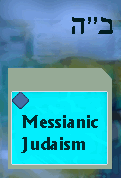 Is Messianic Judaism Biblical Judaism?
Is Messianic Judaism Biblical Judaism? 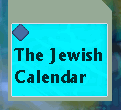 What is the Jewish Calendar?
What is the Jewish Calendar?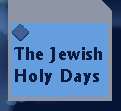 The Jewish Holy Days are the seven God's Holy Days.
The Jewish Holy Days are the seven God's Holy Days.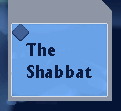 The Shabbat is the seventh day which God sanctified and set apart for worship.
The Shabbat is the seventh day which God sanctified and set apart for worship.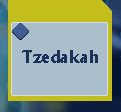 Tzedakah, the righteous giving.
Tzedakah, the righteous giving.